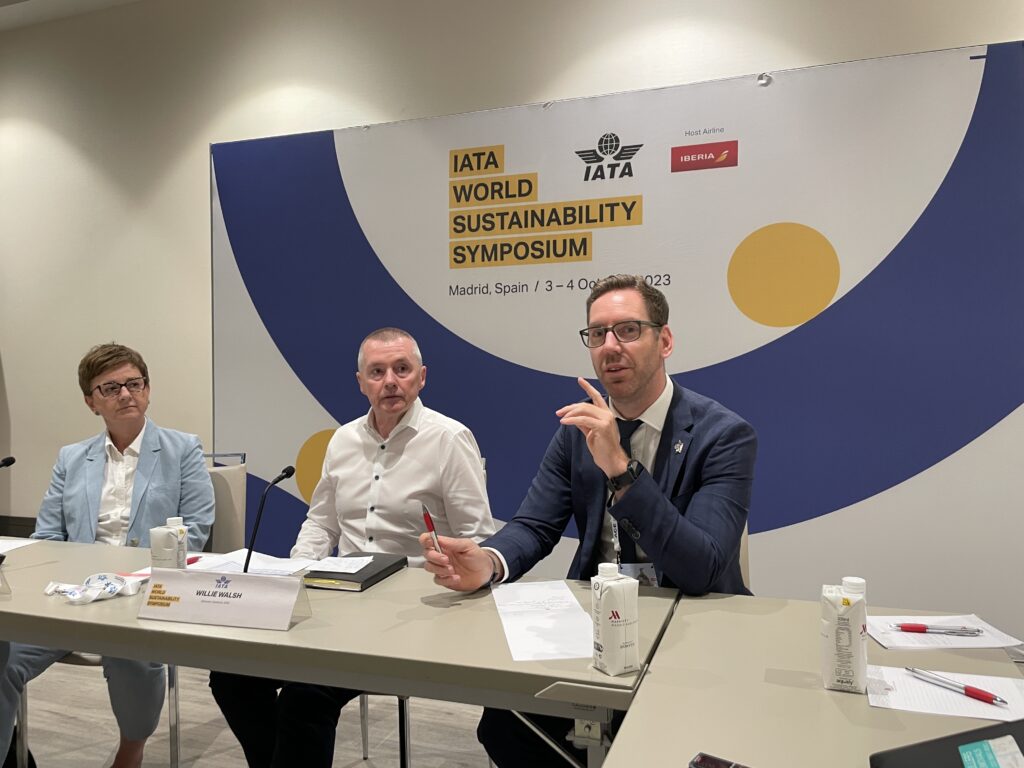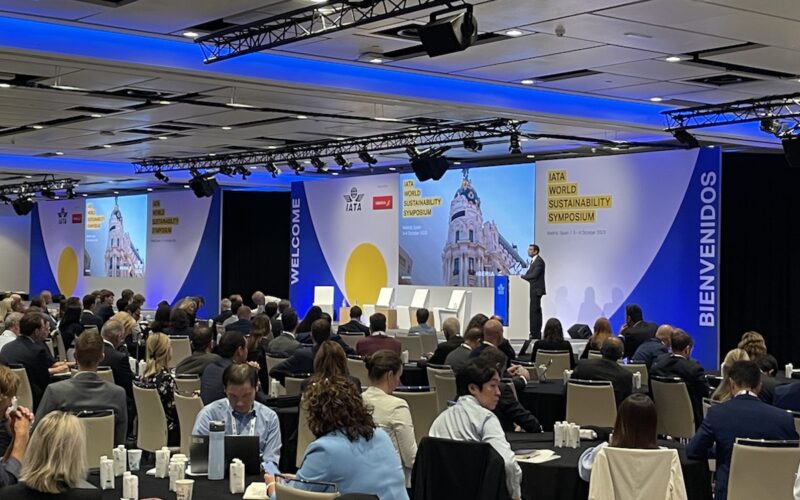On October 3-4, 2023, IATA World Sustainability Symposium transformed Madrid into the epicenter of the aviation sustainability scene.
This two-day forum, organized by the International Air Transport Association (IATA), was absolutely packed with sessions featuring a rather balanced mix of industry experts, policymakers and decision-makers. Among the attendees were CEOs of major airlines such as IAG (Luis Gallego), Air France (Anne Rigail) and LATAM (Roberto Alvo) as well as IATA’s Director General, former British Airways CEO, Willie Walsh.
The rather eclectic nature of the conference program reflected the current state of the aviation sustainability debate: there is an acute awareness of the existential nature of the issue and the need to do “something”. However, with quite a few imperfect paths to get to net zero, there are currently many more questions than answers.
In a conversation with AeroTime, IATA’s Chief Economist, Marie Owens Thomsen, referred to the transition road map published by her organization, which covers all of these pathways. While she expressed her hope that all these different “pieces” of the puzzle can fit together and play a role in the race to decarbonize, Owens was clear in that she expects sustainable aviation fuels (SAF) to be the key tool to get to net zero in 2050.
Owens strongly defended air travel as a driver of progress for humankind.
“All through history, progress in the conditions people live in has come by the hand of advances in mobility,” Owens said. “Big leaps forward have been connected to advances in transportation. Without air connectivity we will have worst economic outcomes for humanity.”
“So, we shouldn’t fly less, we should find a way to fly better,” she stated, before comparing the initial higher costs of green flight technologies to what happened in the wind and solar energy industries, where costs fell dramatically over time. “We can do this!” she concluded optimistically.
Owens was also very critical of legacy policies many governments have still in place that create an unequal playing field favoring the fossil fuel industry.
Similarly, in a closed doors meeting with journalists, IATA Director General, Willie Walsh, raised the topic of SAF mandates and whether those should also apply to fuel producers instead of just airlines.

Walsh expressed concern that airlines are being required to source something that is largely unavailable yet. He wished for a policy framework that promotes environmentally sound results [more SAF available – note ed.], rather than merely imposing penalties if the mandate can’t be met. “Then it essentially becomes a tax that is taking money away from the solution,” he remarked. Walsh also drew a parallel with the road transport industry, in which, he said, mandates have usually been applied to the fuel industry.
“My view is that we need everyone working together for a common goal of environmental importance and that’s where there is a bit of disjointed thinking at the moment,” he concluded.
Walsh also highlighted that the main rationale for the direct investments some airlines are making in the SAF sector [airlines like British Airways, United Airlines and Wizz Air among others have announced equity investments in SAF refinery projects – Note Ed.] is to give a signal to the financial community in order to entice more investors to join the fray. The same logic applies to offtake agreements. The main problem when it comes to attracting investment from outside the industry to new SAF projects is uncertainty about what the framework is going to be, Walsh stated.
“Investors want to see some sort of certainty before they put their money in,” he remarked, while clarifying he referred to regulatory risk “the science is proven”.
Another technology that got its fair bit of attention at the World Sustainability Symposium is direct air capture. Anna Stukas, VP Business Development at Carbon Engineering, took to the stage to share some insights about what this Canadian company is doing.
Stukas explained how, with this technology, it is possible to capture CO2 from the air and put it back underground or use it, after some processing, as feedstock for the production of sustainable aviation fuel. Can this be done economically and at a large enough scale to make a difference? To be clear, direct carbon capture has its fair share of skeptics within the industry, but it has also caught the attention of some large players. Carbon Engineering was acquired in August 2023 by Occidental Petroleum, that paid $1.1 billion for it.
Finally, IATA’s World Sustainability Symposium devoted also some of its sessions, mostly on the second day of the event, to the non-carbon aspects of sustainability, such as non-CO2 emissions or the lifecycle of materials and waste management.
In short, it was a rather comprehensive event for aviation professionals looking for a deep dive into the many facets of the sustainability challenge.

